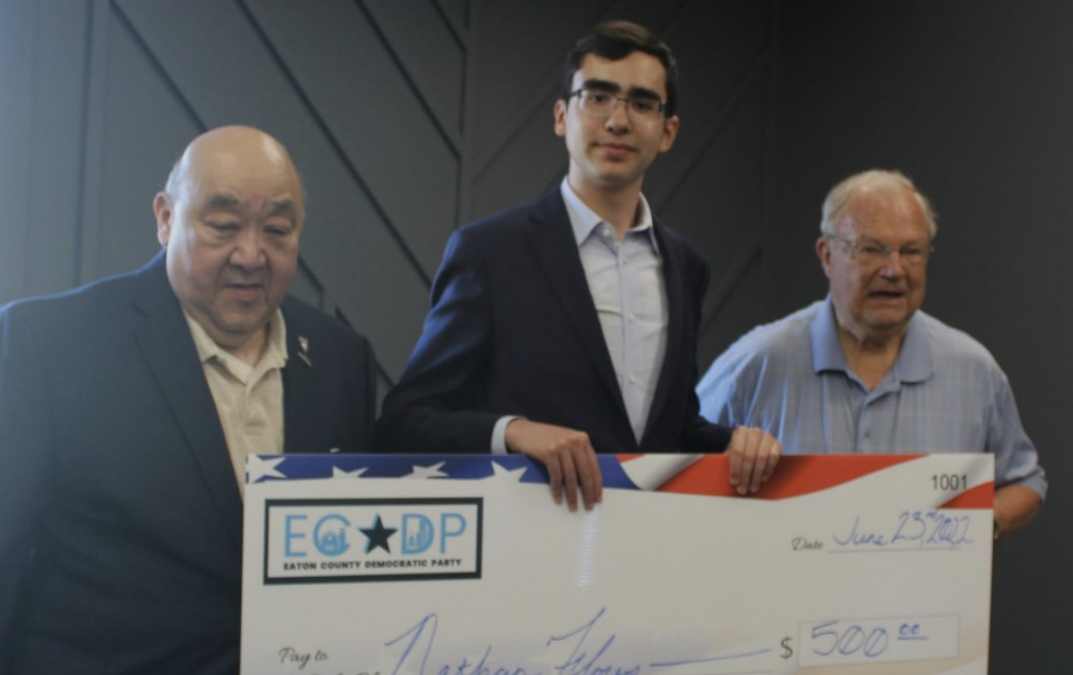We are pleased to announce that Nathan Flores is the 2022 recipient of the Kelly Rossman-McKinney Scholarship! Nathan is set to begin his college journey at the University of Michigan – Ann Arbor this fall where he was accepted into the College of Literature, Science, and the Arts.
As part of this year’s process, we asked applicants to write an essay on the importance of voting in a democracy. You can read Nathan’s essay on the importance of voting below. We are excited to support the start of Nathan’s journey in higher education and look forward to the positive mark he will leave on the world.
The Eaton County Democratic Party offers an annual scholarship named in honor and memory of Kelly Rossman-McKinney. The Kelly Rossman-McKinney Scholarship is a $500 non-renewable scholarship to a student seeking to further their education at a trade school or college. The application is generally available in the spring.
– – – – –
“For a democracy to function effectively, civic participation must be paramount. In the United States, voting ensures a peaceful transition of power every few years. It is universally agreed that in a democracy it is the civic duty of every citizen to vote in every election. With leaders around the world increasingly delegitimizing the integrity of electoral processes, voting is more important than ever for upholding basic liberties in the modern world. The United States’ current political system is primarily based on modern philosophers’ ideals. One of the most influential philosophers is John Locke, who in his various works developed his theory on the social contract. Locke suggested that the people have the right to replace governments that fail to protect citizens and serve the greater good. In today’s democracies, the replacement of government occurs on a mostly regular basis. By voting in a democracy, citizens ensure that the government is serving in the best interests of the people.
Unfortunately, democracy in practice is harder to enact effectively than it seems on paper. Many nations around the world, including the United States, have been backsliding towards
authoritarianism even though democracy has been enshrined into many nations’ constitutions. For example, in Turkey, President Recep Erdoğan and the Justice and Development Party have consolidated power and unilaterally control almost every federal institution. The president has been widely criticized for his unwelcoming attitude towards critics and the government has forged ties with most major media outlets and has mostly eliminated critical reporting. Furthermore, Turkey ranks 103 out of 167 in the Economist Intelligence Unit’s Democracy Index and is classified as a “hybrid regime.” Despite the sour state of democracy in Turkey, turnout in general elections remains extraordinarily high, with almost 89 percent of the voting-age population participating in the 2018 general election, which is remarkable in context to declining global voter turnout.
The statistical anomaly associated with Turkey’s voter turnout despite democratic backsliding may be a reaction to the weakening of civil and political freedoms in the country. When so much power is concentrated in the hands of one person, the populace may sense that there is far too much to lose by not voting. In addition, in an environment of political adversity, citizens may use polls as a last resort for effectively expressing their opinion on the government. Witnessing what authoritarian rule means for the country, the population’s high voter turnout may also be an act of desperation in saving the country from autocracy.
Democracy in the United States is in a significantly stronger state than Turkey’s, although democratic backsliding has slowly crept in. Over the past decade, the Democracy Index shows roughly a five percent decline in its score. However recently, voters are increasingly engaged in politics. In 2018, voter turnout in the midterm election was at the highest level in the past century. In addition, the number of participants in the 2020 general election was approximately 20 million greater than in the 2016 general election. The increase in participation shows that even though the United States is struggling to retain its functioning democracy, voters remain vigilant in upholding one of the nation’s founding principles.
Voting in a democracy is more than simply a civic duty. For many nations, voting is a symbolic act of upholding freedom when faced with authoritarianism. The modern world has seen technological miracles, but dictators can use technology to remain in power, rendering John Locke’s theory on the social contract less likely to materialize. When faced with a dysfunctional democracy, the vote of the people may be one of the few methods to express opinions. Although the United States is far from slipping into a dictatorship, the momentum seems to be shifting towards it, so voting will be more vital than ever in upholding political rights and civil liberties.”

